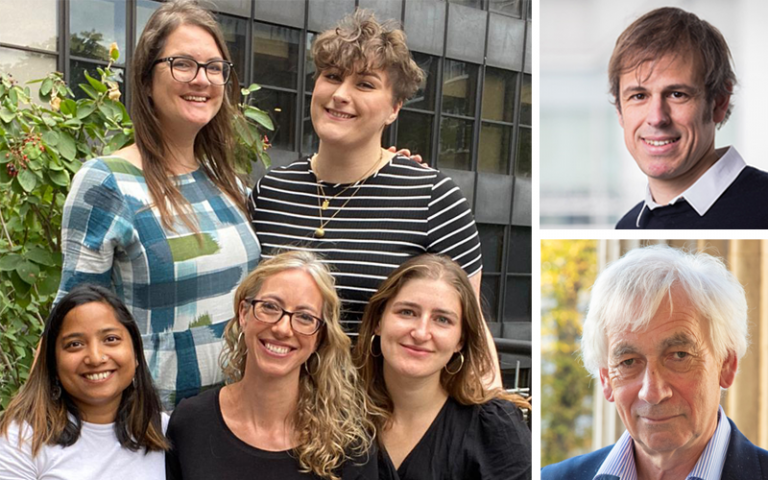UCL academics honoured by the Royal Society
24 August 2022
Professor Richard Ellis (UCL Physics & Astronomy), Professor Tiago Branco (Sainsbury Wellcome Centre at UCL), and the UCL STEM Participation and Social Justice team have received prestigious awards from the Royal Society.

The UCL STEM Participation and Social Justice research group, based at IOE, UCL’s Faculty of Education and Society, aims to make STEM (science, technology, engineering and mathematics) more inclusive, accessible and equitable for all young people. Its research projects range from working with primary school teachers in developing a “science capital” teaching approach that helps children find more meaning and relevance in science subjects, to a longitudinal research project following young people’s career aspirations from age 10 to 23.
The team was awarded the Royal Society Athena Prize “for their cutting-edge research and development projects which have increased understanding, transformed practice, and led to more equitable participation in STEM”. The prize recognises teams who have contributed most to the advancement of diversity in STEM.
Professor Louise Archer (IOE), who leads the group, said: “It is wonderful to have the STEM Participation & Social Justice group’s work recognised by the Royal Society and the scientific community. We hope that winning this award can further our messages of social justice within science education and help us to continue to improve equitable STEM participation for young people.”
Professor Richard Ellis (UCL Physics & Astronomy), who has tracked ever more distant galaxies over his career in a quest to find the moment of “cosmic dawn”, when stars first lit up the Universe, was awarded Royal Medal A, the Society’s highest honour for the physical sciences.
Professor Ellis was awarded the medal for “motivating numerous advances in telescopes and instrumentation, and exploiting these facilities to revolutionise the understanding of cosmological evolution”. The Society noted that Professor Ellis “had foreseen the importance of applying new technologies, motivating him to raise funds, design and then exploit innovative instruments that have greatly accelerated progress [in the field]”.
Professor Ellis said: “I am greatly honoured to be the recipient of this major Royal Society award, joining a distinguished list of previous awardees, many of whom have been my personal scientific heroes.” Previous recipients of the award include the Nobel laureates Professor Abdus Salam and Professor Sir Roger Penrose. At UCL, previous winners have included Professor Sir Harrie Massey and Professor Sir Michael Pepper (UCL Electronic & Electrical Engineering).
Professor Tiago Branco (Sainsbury Wellcome Centre at UCL) was awarded the Francis Crick Medal and Lecture for “making fundamental advances in the molecular, cellular and circuit bases of neuronal computation and for successfully linking these to animal behaviour”.
Professor Branco’s current research investigates how the mouse brain implements escape behaviour, helping to improve understanding of how the brain performs computations and of areas of the human brain that are involved in anxiety and post-traumatic stress disorder, with the hope of finding new ways to treat these mental health conditions.
He said: “I am honoured to receive the Francis Crick Medal and Lecture. It is a great privilege to have our work recognised by the Royal Society and through this award become associated with Francis Crick and Sydney Brenner – two giants of science whose work has been such a source of inspiration over the years.
“I feel extremely grateful for all the support I have had in my career so far and for all the amazing colleagues that I work with, especially the young people who keep injecting new ideas, excitement, and pushing science in the group beyond our comfort zone. The body of work that this award recognises is a truly collaborative effort across many incredible people. I am excited that this award might increase the visibility of our field and of the importance of curiosity-driven science.”
Sir Adrian Smith, President of the Royal Society, said, “On behalf of the Royal Society, I offer my congratulations to the outstanding researchers, individuals and teams whose contributions to our collective scientific endeavour have helped further our understanding of the world around us. I am proud that we can celebrate outstanding scientific contributions in all their forms.”
Links
- Royal Society awards 2022
- UCL STEM Participation and Social Justice research group
- Professor Louise Archer’s academic profile
- IOE, UCL’s Faculty of Education and Society
- Professor Richard Ellis’s academic profile
- UCL Physics & Astronomy
- UCL Mathematical & Physical Sciences
- Professor Tiago Branco’s academic profile
- Sainsbury Wellcome Centre at UCL
- UCL Life Sciences
Image
- Clockwise from left: STEM Participation and Social Justice team; Professor Tiago Branco; Professor Richard Ellis.
Media contact
Mark Greaves
T: +44 (0)7990 675947
E: m.greaves [at] ucl.ac.uk
 Close
Close

